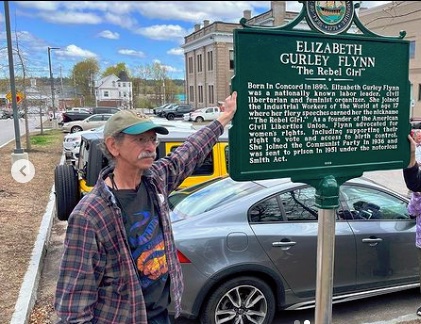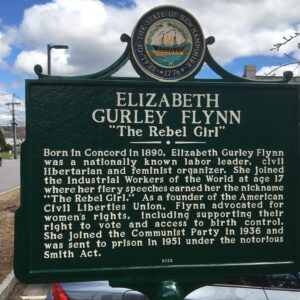The Sununu administration approved a new Historical Highway Marker honoring a committed Communist from Concord who received a state funeral in Moscow’s Red Square. Now state officials are asking how it happened.
On Monday, May 1 — May Day for the international Socialist movement — the New Hampshire Department of Natural & Cultural Resources unveiled the marker honoring Elizabeth Gurley Flynn, who once led the Communist Party USA.
Flynn was born in 1890 in Concord and became a socialist activist in her teens. She was a founding member of the American Civil Liberties Union and, in 1936, joined the Community Party, becoming the U.S. Party Chair in 1961.
Her decision to join the Communist Party during the period of Josef Stalin’s deadly purge and high-profile show trials is particularly disturbing. In fact, her membership in the party got her expelled from the ACLU in 1940. A decade later, she was found guilty under the Smith Act of advocating the overthrow of the U.S. government by force and violence.
The Soviet government gave Flynn a state funeral in Red Square, with more than 25,000 people attending.
Executive Councilor Dave Wheeler (R-Milford) brought up the marker during Wednesday’s Executive Council meeting, expressing his outrage that the state would approve a memorial to an enemy of the United States.
Wheeler said Flynn’s maker in Concord is an insult to every Granite Stater who ever served in the military, including the veteran who led the council’s Pledge of Allegiance before the meeting. “I’m just totally offended by that. I think it’s a slap in the face to the veteran who did our Pledge of Allegiance this morning,” Wheeler said.
Fellow Republican Joe Kenney also voiced his opposition.
“This is a devout Communist. We are the ‘Live Free or Die’ state,” Kenney said. “How can we possibly promote her propaganda, which still exists now through this sign in downtown Concord?”
Executive Councilor Cinde Warmington, the lone Democrat on the five-member committee, represents the city of Concord, whose Heritage Commission requested the marker. Warmington didn’t comment during the discussion. She also declined to respond to requests for comment from NHJournal.
Gov. Chris Sununu learned of the marker Wednesday morning and was not happy with what he heard during the Governor’s Council meeting.
“I completely agree with the sentiment here,” Sununu said, and he pledged to “dig into” how it happened. He also grilled Sarah Stewart, commissioner for the New Hampshire Department of Natural and Cultural Resources, whose agency oversees the historic marker program.
Stewart claimed her office wasn’t responsible for Flynn’s marker, telling the governor the application came through the city of Concord. “Our agency is not in the business of approving or denying the markers,” Stewart said. “We check for factual accuracy, and we help make sure that the text fits on the space allocated on the marker.”
Sununu was not satisfied with his commissioner’s answer.
“Who at the state level says ‘yes or no,’ regardless of what a town wants?” Sununu asked. “Who at the state level says, ‘We are going to do this, or we’re not going to do that?’”
“There is a criterion that is evaluated by the Division of Historical Resources staff and the State Historical Resources Council,” Stewart acknowledged.
“I’ll tell you what: We’re going to review the whole process,” Sununu said. “The state obviously has authority here, and responsibility — it’s a state marker.”
The state’s rules for the Historical Highway Marker program clearly give Stewart and her agency the power to vet applications and approve or deny them as she sees fit. The rules have been in effect since 1958.
“The DHR shall have the function, including but not limited to, ‘Considering proposals to erect highway historical markers under RSA 236:41. No such marker shall be put in place without division approval,’” the rules state.
Michael Bruno literally wrote the book on the state’s Historical Highway Markers. The author of “Cruising New Hampshire History,” Bruno told NHJournal he was disturbed by the state’s decision to remember Flynn.
“I’m a veteran, and I served in the Cold War,” Bruno said. “I don’t see why we’re commemorating this person.”
Most disappointing for Bruno is the fact that each Historical Highway Marker includes the state seal of New Hampshire. “It looks like an endorsement from the state,” he said.

Arnie Alpert
Arnie Alpert, a New Hampshire activist who was a leader in the left-leaning American Friends Service Committee, defended the marker and Flynn, though he said he couldn’t defend all of her choices.
“She was a significant figure in American history,” Alpert said.
Alpert said Flynn was visiting the Soviet Union in 1964 to work on her memoirs when she died. The state funeral with honors in Red Square can’t be held against her.
“She was dead; she didn’t order up any state funeral,” Alper said.
Alpert said that her 1951 conviction had more to do with the McCarthy-era anti-Communist witch hunts than any threats of violent revolution. Flynn was convicted for believing in Communism, not trying to overthrow the country, he said.
“If she was guilty of anything, she was guilty of her beliefs,” Alpert said.
Still, the timing of her Communist allegiance raises questions. When Smith joined in 1936, the Soviets had already murdered close to 9 million people in Ukraine and other territories in what is now known as the Holodomor. Another 1.2 million were about to be killed in Stalin’s great purge. When she became the head of the American Communist Party, dissident writer Alexander Solzhenitsyn was just a few years removed from serving a decade in the Soviet gulags and internal exile.
“I’m not here to defend every step in the life of Elizabeth Gurley Flynn,” Alpert said.
Flynn had no problem speaking for herself. In a May 6, 1940 speech, she praised the USSR.
“On May Day, we salute the Soviet Union – land of socialism – land of peace and plenty, the great ideal of labor since time immemorial, the cooperative commonwealth of all who toil,” Flynn said.




